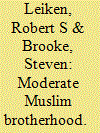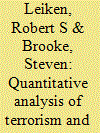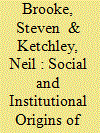|
|
|
Sort Order |
|
|
|
Items / Page
|
|
|
|
|
|
|
| Srl | Item |
| 1 |
ID:
156160


|
|
|
|
|
| Summary/Abstract |
Under what conditions can parties use social-service provision to generate political support? And what is the causal mechanism connecting social-service provision to citizen mobilization? I argue that service provision conveys to voters a politically valuable image of the provider organization’s competence and probity, which is particularly valuable when information about parties and platforms is contradictory or poor. Support comes from an in-depth investigation into the medical networks of the Egyptian Muslim Brotherhood. I combine qualitative evidence, including fieldwork and interviews with Brotherhood social-service providers, with an original 2,483-person survey experiment of Egyptians. Respondents exposed to factual information about the Brotherhood’s medical provision are significantly more likely to consider voting for the Brotherhood in elections. A causal mediation analysis, as well as qualitative evidence drawn from the survey instrument itself, supports the hypothesized mechanism by which respondents map the Brotherhood’s compassion and professionalism in the provision of medical services onto their views of Brotherhood candidates for elected office. Beyond adding to a growing comparative-politics literature on the politics of non-state social service provision, I identify why Egypt’s current rulers have expended such effort to uproot the Muslim Brotherhood’s nationwide network of social services.
|
|
|
|
|
|
|
|
|
|
|
|
|
|
|
|
| 2 |
ID:
080940


|
|
|
|
|
| Publication |
2008.
|
| Summary/Abstract |
In 2004 Lia and Hegghammer observed a new genre of "jihadi strategic studies," characterized by secular-rational analyses, familiarity with Western sources, and a willingness to self-critique. Through four case studies (the strategies of takfir groups in 1960/1970s Egypt, the far enemy-near enemy debate, the differing revolutionary modes of Al Jihad and Gamaa Islamiyya, and the decision by Al Qaeda to target the West) this article finds that many of the traits observed by Lia and Hegghammer have deep roots among jihadist thinkers. This article will interest those who study terrorism, strategy, and the history of Islamic militancy
|
|
|
|
|
|
|
|
|
|
|
|
|
|
|
|
| 3 |
ID:
076423


|
|
|
|
|
| Publication |
2007.
|
| Summary/Abstract |
Even as Western commentators condemn the Muslim Brotherhood for its Islamism, radicals in the Middle East condemn it for rejecting jihad and embracing democracy. Such relative moderation offers Washington a notable opportunity for engagement -- as long as policymakers recognize the considerable variation between the group's different branches and tendencies.
|
|
|
|
|
|
|
|
|
|
|
|
|
|
|
|
| 4 |
ID:
074605


|
|
|
|
|
| Publication |
2006.
|
| Summary/Abstract |
This article uses immigration and other biographical data to refute much of the conventional wisdom about the relationship between terrorism and immigration. Using a database created from the biographical data of 373 terrorists, we have established a number of significant findings. Over forty percent of our database is made up of Western Nationals. Second, despite widespread alarms raised over terrorist infiltration from Mexico, we found no terrorist presence in Mexico and no terrorists who entered the U.S. from Mexico. Third, we found a sizeable terrorist presence in Canada and a number of Canadian-based terrorists who have entered the U.S. In addition to illuminating the terrorist networks entrenched in the West, this paper is also an attempt to advance the field of terrorism studies by taking a quantitative approach to data analysis.
|
|
|
|
|
|
|
|
|
|
|
|
|
|
|
|
| 5 |
ID:
176559


|
|
|
|
|
| Summary/Abstract |
This article probes the return of the Muslim Brotherhood to prominence in 1970s Egypt through a systematic analysis of advertisements in the organization’s flagship periodical, al-Daʿwa (The Call). In every issue of the magazine, which was published between June 1976 and October 1981, entreaties to proper conduct and appeals to Islamic solidarity appeared alongside advertisements for everything from Pepsi to breakfast biscuits to automobiles. We utilize the methodological insights of social and cultural historians to the value of advertisements to cast new light on the reconstruction of the Brotherhood, its relationship with the diverse institutions comprising the Egyptian state, and on how the Muslim Brotherhood’s vision of piety both reflected and challenged a changing economic reality. Moving beyond a story of the Brotherhood’s return as a product of independent Islamist enterprise that had emerged due to both the Gulf oil boom and Egypt’s economic liberalization programme, significant public sector advertising in al-Daʿwa, especially prominent across the most valuable advertising real estate, underscores both internal divisions within the Egyptian state as well as the tangible ways that various state institutions were patrons of religious change.
|
|
|
|
|
|
|
|
|
|
|
|
|
|
|
|
| 6 |
ID:
159505


|
|
|
|
|
| Summary/Abstract |
Under what conditions did the first Islamist movements organize? Which social and institutional contexts facilitated such mobilization? A sizable literature points to social and demographic changes, Western encroachment into Muslim societies, and the availability of state and economic infrastructure. To test these hypotheses, we match a listing of Muslim Brotherhood branches founded in interwar Egypt with contemporaneous census data on over 4,000 subdistricts. A multilevel analysis shows that Muslim Brotherhood branches were more likely in subdistricts connected to the railway and where literacy was higher. Branches were less likely in districts with large European populations, and where state administration was more extensive. Qualitative evidence also points to the railway as key to the movement’s propagation. These findings challenge the orthodoxy that contact between Muslims and the West spurred the growth of organized political Islam, and instead highlight the critical role of economic and state infrastructure in patterning the early contexts of Islamist activism.
|
|
|
|
|
|
|
|
|
|
|
|
|
|
|
|
|
|
|
|
|